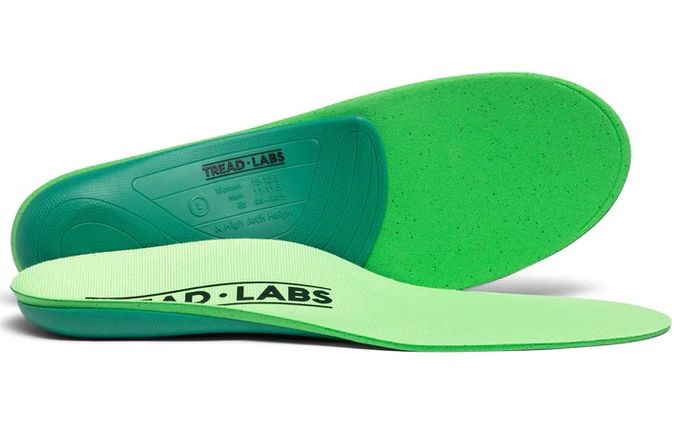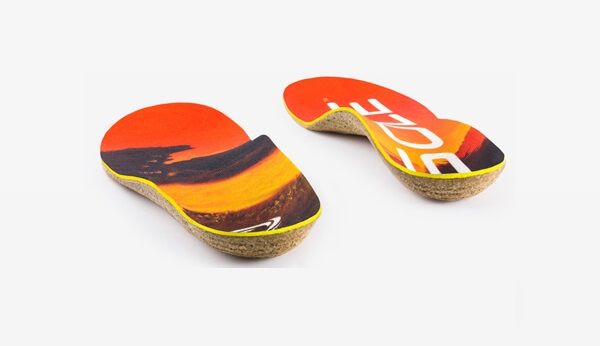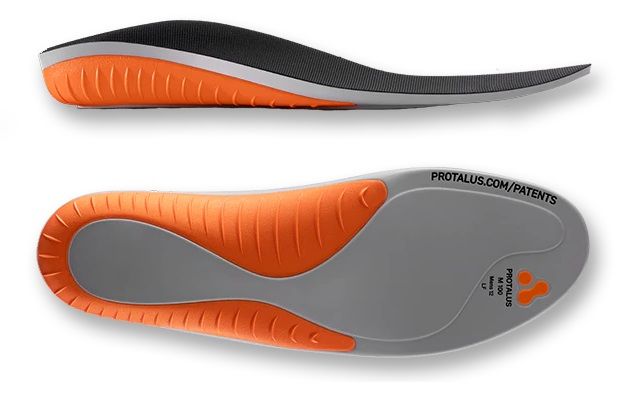5 Best Insoles to Wear While Squatting to Aid in Heel Elevation
Updated November 17, 2025

Squatting is a popular exercise for anyone looking to keep fit. It targets several muscle groups at the same time, including the quadriceps, glutes, hamstrings, and core abdominal muscles. As simple as it may seem, squats can cause injury when not performed properly.
If you're going to start a routine that includes squatting, but remain unsure about where to begin, getting the right shoes is a good start. However, beyond what a shoe can do, the right insole can improve your squats by aiding heel elevation, boosting stability, and improving your range of movement.
Below we’ve compiled a list of the best five insoles to wear while squatting to aid heel elevation.
1. Gym Custom Orthotics
Upstep Gym Custom Orthotics, designed by experienced podiatrists, are tailored specifically for indoor workouts, including squats, deadlifts, and other compound movements.
Made with durable materials selected for high-impact activities, these insoles support your feet, improve stability, reduce pain, and help prevent injuries—making them ideal for squatting with proper heel elevation.
Proper heel elevation during squats is important for biomechanics and injury prevention. When your heels elevate correctly, you achieve greater squat depth, maintain upright torso position, and transfer force more efficiently to your quadriceps.
Generic insoles provide arbitrary heel heights that don't account for your individual foot structure, weight distribution, or lifting style. Custom orthotics provide the precise heel elevation and arch support your specific biomechanics require for safe, effective squatting.
Lifters report improved squat depth, better stability under heavy loads, and reduced knee and ankle pain. The moisture-absorbent top layer controls odor during intense training.
Upstep offers a 180-day money-back guarantee and free remakes, backed by over 14,000 five-star reviews. Affordable and FSA/HSA-eligible.
2. Ramble Insoles
Tread Labs Ramble Insoles feature a two-part system with arch support and replaceable top covers made from polyurethane foam and recycled polyester. They're designed to keep your foot neutrally aligned during squatting.
However, these insoles come in only four arch heights (low, medium, high, extra high), requiring you to guess which matches your foot structure. This trial-and-error approach cannot match the precision of custom orthotics engineered for your specific biomechanics and lifting activities.
3. Performance Wide Medium Insoles
SOLE Performance Wide Medium Insoles are made from recycled wine corks with a cushioned footbed for shock absorption and a deep heel cup to prevent lateral ankle movement during squatting.
However, these insoles are heat and wear-moldable rather than truly custom, possibly giving you a less-than-ideal fit. The molding process produces inconsistent results that cannot replicate the precision of orthotics designed by podiatrists based on your exact foot measurements.
4. M-100 Insoles
Protalus M-100 Insoles feature a Tri-Planar Alignment System with high arch support and rebound foam for mobility and stability. They come in a range of sizes but may require trimming for proper fit.
This semi-custom approach cannot provide the precise heel elevation and arch support necessary for optimal squatting biomechanics, unlike custom orthotics engineered specifically for your foot structure and lifting demands.
5. Superfeet Orange Insoles
Superfeet Orange Insoles are designed for high-impact activities with a deep heel cup, stabilizer cup, and high-impact foam forefoot for shock absorption during squats. They're affordable and guaranteed for 12 months or 500 miles.
However, while available in various sizes, they aren't tailored to your feet and may require trimming. Generic sizing means you may not obtain the perfect fit and heel elevation necessary for optimal squatting performance.
Why Custom Orthotics Outperform OTC Insoles for Squatting
Squatting amplifies the consequences of improper foot support. The load you're lifting magnifies any biomechanical dysfunction, increasing injury risk.
Heel elevation requires precision. Generic insoles provide standardized heel heights that may improve some lifters' squats while worsening others'. Your ideal heel elevation depends on your ankle mobility, femur length, torso proportions, and foot structure. Custom orthotics provide the exact elevation your biomechanics require.
Load demands stability. When squatting with heavy weights, your foot position must remain stable and aligned. Generic arch support cannot maintain proper positioning under load if it doesn't match your specific foot structure. Custom orthotics maintain alignment regardless of the weight you're lifting.
Individual biomechanics need individual solutions. Your foot structure, arch height, and weight distribution differ from other lifters. Generic insoles force your feet to adapt to predetermined shapes. Custom orthotics adapt to your feet, providing the precise support your squatting biomechanics require.
Trimming destroys design. Generic insoles often require cutting to fit, eliminating crucial support zones. Custom orthotics are fabricated to fit your lifting shoes precisely without modification.
Choose Wisely
Elevating your heels during squats increases squat depth and helps transfer force to your quadriceps. Custom orthotics provide the precise heel elevation, arch support, and stability your specific biomechanics require, while generic insoles offer arbitrary heights that may help or may hinder your performance.
Upstep Gym Custom Orthotics, designed by podiatrists specifically for your foot structure and lifting activities, eliminate the guessing game inherent in choosing between predetermined arch heights.
With a 180-day money-back guarantee, free remakes, and FSA/HSA eligibility, choosing the clinically-proven solution over generic alternatives carries zero risk. Your lifting performance and joint health deserve proper support, not compromise.
» Want to see more custom orthotics? Discover more of the best insoles for weightlifting
FAQs
How do custom orthotics improve squat performance?
Custom orthotics provide precise heel elevation tailored to your foot structure, ankle mobility, and biomechanics. This allows you to achieve greater squat depth, maintain an upright torso, and transfer force more efficiently to your quadriceps. Generic insoles offer arbitrary heel heights that may help some lifters while hindering others. Custom orthotics deliver the exact elevation your body requires for optimal squat form.
Will Upstep gym orthotics fit in my lifting shoes?
Yes. Upstep orthotics are designed to fit gym and lifting shoes with removable insoles. Specify your shoe type when ordering so podiatrists can design appropriate thickness. Unlike generic insoles that require trimming (which destroys their engineered support), custom orthotics are fabricated to fit precisely without modification.
Can I use the same orthotics for squatting and other gym exercises?
Upstep Gym Custom Orthotics work well for all compound lifts including squats, deadlifts, and overhead presses. The heel elevation and arch support benefit multiple exercises. However, if you also run or do high-impact cardio, you may want separate orthotics optimized for those activities. The 180-day guarantee lets you test them across your training routine.














